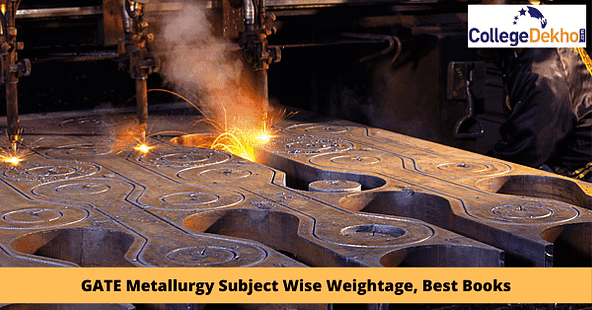Check GATE 2024 Metallurgy Syllabus along with chapter or subject wise weightage here. In addition, candidates can also check the list of best books for GATE Metallurgy here.

GATE 2024 Metallurgy Exam: GATE exam is one of the most popular national-level entrance exams which is conducted to provide admission to the 2-year M.Tech Program at Engineering Colleges in India. Along with other subjects, Metallurgy is also a popular GATE subject for which thousands of students register every year. One of the keys to scoring good marks in the GATE Metallurgy exam is to prepare an effective preparation strategy. In order to prepare a good preparation plan, it is also important for the candidates to be aware of the preparation tips, syllabus, and other aspects of Metallurgy. The following article will overview the GATE 2024 Exam Metallurgy preparation tips, syllabus, topics-wise weightage, and best books.
LATEST: GATE 2024 Admit Card Released: Download link activated at gate2024.iisc.ac.in
Also read: GATE Syllabus 2024
GATE 2024 Metallurgy Syllabus
The IIT Kanpur has released the GATE Metallurgy syllabus 2024 in the official notification 2024. Before diving into the subject-wise weightage of GATE 2024 Metallurgy, go through the GATE syllabus 2024 for metallurgy given below to check the subjects and topics that will come in the exam.
GATE Metallurgical Engineering Section | |
|---|---|
Engineering Mathematics- Section 1 | Calculus: Maxima and minima; Limit, Continuity, and Differentiability; Partial derivatives; Sequences and series; Test for convergence; Fourier series. Linear Algebra: Systems of linear equations, Matrices and Determinants, Eigen values and Eigen vectors. Differential Equations: Higher order linear ODEs with constant coefficients; Linear and non-linear first order ODEs; Cauchy’s and Euler’s equations; one-dimensional heat and wave equations, Laplace transforms; PDEs –Laplace, Numerical Methods: integration by trapezoidal and Simpson’s rule; Solutions of linear and non-linear (Bisection, Secant, Newton- Raphson methods) algebraic equations; single and multi-step methods for differential equations. Vector Calculus: Gradient; Stokes, Gauss and Green’s theorems, Divergence and Curl; Line, Surface and volume integrals Probability and Statistics: Mean, median, mode and standard deviation; Analysis of experimental data; linear least squares method, Definitions of probability and sampling theorems, conditional probability, Random variables; Poisson, normal and binomial distributions; |
Metallurgical Thermodynamics- Section 2 | Electrochemistry: Electrochemical cells, Single electrode potential, Nernst equation, Potential-pH diagrams. Laws of thermodynamics:Enthalpy, Gibbs and Helmholtz free energy; Maxwell’s relations; Chemical potential; First law – energy conservation, Second law – entropy; Gibbs phase rule, phase equilibria, binary phase diagram and lever rule, free-energy vs. composition diagrams; Applications to metallurgical systems, solutions, ideal and regular solutions; Equilibrium constant, Activity, Ellingham and phase stability diagrams; Thermodynamics of point defects, surfaces and interfaces, adsorption and segregation phenomena. |
Transport Phenomena and Rate Processes- Section 3 | Heat transfer: Fourier’s Law, 1-D steady state conduction, Conduction, Momentum transfer: Mechanical energy balance equation, Concept of viscosity, shell balances, Bernoulli’s equation, flow past plane surfaces and through pipes. Convection: Heat transfer coefficient relations for forced convection. Mass transfer: Mass transfer coefficients, Diffusion and Fick’s laws Radiation: Black body radiation, Kirchhoff’s Law, Stefan-Boltzman Law, Dimensional analysis: Significance of dimensionless numbers, Buckingham Pi theorem Electrochemical kinetics: Polarization. Basic laws of chemical kinetics: reaction rate constant, Arrhenius relation, First order reactions, heterogeneous reactions, oxidation kinetics. |
Mineral Processing and Extractive Metallurgy- Section 4 | Material and Energy balances in metallurgical processes; Principles and processes for the extraction of non- ferrous metals – aluminium, copper and titanium. Comminution techniques:Gravity and other methods of mineral beneficiation; Size classification, Flotation, Agglomeration: sintering, pelletizing and briquetting. Iron and steel making: Structure and properties of slags and molten salts – basicity of slags – sulphide and phosphate capacity of slags; Material and heat balance in blast furnace; Production of metallurgical coke. Primary steelmaking: Process dynamics, Basic oxygen furnace, oxidation reactions, electric arc furnace. Other methods of iron making (COREX, MIDRE) Continuous Casting: Fluid flow in the tundish and mold, heat transfer in the mold, segregation, inclusion control. Secondary steel making: argon stirring, Ladle process – deoxidation, desulphurization, principles of degassing methods; inclusion shape control, Basics of stainless steel manufacturing. |
Physical Metallurgy- Section 5 | X-ray Diffraction – optical metallography, principles of SEM imaging, Bragg’s law, Chemical Bonding: Ionic, covalent, metallic, and secondary bonding in materials, Crystal structure of solids – metals and alloys, ionic and covalent solids, and polymers. Crystal Imperfections: Coherent, semi-coherent and incoherent interfaces, Point, line and surface defects; Phase transformation: Driving force, Homogeneous and heterogeneous nucleation, growth kinetics. Diffusion in solids: Diffusion equation, steady state and error function solutions; Examples- homogenization and carburization; Kirkendall effect; Uphill diffusion; Atomic models for interstitial and substitutional diffusion; Pipe diffusion and grain boundary diffusion. Solidification in isomorphous, eutectic, and peritectic systems, cast structures and macrosegregation, dendritic solidification and constitutional supercooling, coring, and macrosegregation. Principles of heat treatment of steels, Recovery, recrystallization and grain growth; TTT and CCT diagrams; Surface hardening treatments; Heat treatment of cast iron and aluminum alloys. Solid state transformations: Precipitate coarsening, Gibbs-Thomson effect, Precipitation, spinoidal decomposition, ordering, massive transformation, discontinuous precipitation, eutectoid transformation, diffusionless transformations Electronic, magnetic and optical properties of materials. Basic forms of corrosion and its prevention. |
Mechanical Metallurgy- Section 6 | Dislocation theory: Edge, screw and mixed dislocations, source and multiplication of dislocations, stress fields around dislocations; Partial dislocations, dislocation interactions and reactions. Strain tensor and stress tensor, Representation by Mohr’s circle, elasticity, stiffness and compliance tensor, Yield criteria, Plastic deformation by slip and twinning. Strengthening mechanisms: Work/strain hardening, strengthening due to grain boundaries, solid solution, precipitation and dispersion. Fatigue: Cyclic stress-strain behavior – low and high cycle fatigue, crack growth. Fracture behavior, fracture toughness, Griffith theory, linear elastic fracture mechanics, fractography, ductile to brittle transition. Mechanisms of high-temperature deformation and failure; creep and stress rupture, stress exponent and activation energy. |
Manufacturing Processes- Section 7 | Hot, warm and cold working of metals: Metal forming – fundamentals of metal forming processes of rolling, forging, extrusion, wire drawing and sheet metal forming, defects in forming. Metal casting: Mould design involving feeding, gating and rising, casting practices, and casting defects. Metal joining: Principles of soldering, brazing and welding, welding metallurgy, defects in welded joints in steels and aluminum alloys. Non-destructive Testing (NDT): Dye-penetrant, ultrasonic, radiography, eddy current, acoustic emission and magnetic particle inspection methods. Powder metallurgy: production of powders, compaction and sintering |
Quick Link:
GATE 2024 Metallurgy Subject Wise Weightage
The subject-wise weightage is an important component for the candidates which will help the candidate prepare accordingly. Given below is the GATE 2024 Metallurgy subject-wise weightage for different subjects:
Subject | Important Topics | Weightage (%) |
|---|---|---|
Metallurgical Thermodynamics |
| 10% |
General Aptitude |
| 15% |
Engineering Mathematics |
| 15% |
Physical Metallurgy |
| 20% |
Transport Phenomena and Rate Processes |
| 10% |
Mineral Processing and Extractive Metallurgy |
| 5% |
Mechanical Metallurgy |
| 15% |
Manufacturing Processes |
| 10% |
Note- The GATE Metallurgy subject-wise weightage given above is tentative as per the previous year's trends not official.
What is Good GATE Score in Metallurgy?
Many candidates wonder how much score is a good score is in the GATE Metallurgy exam. Given below is the analysis of GATE 2024 expected good score for Metallurgy:
Subject | Expected Good Score |
|---|---|
Engineering Mathematics | 15-20 |
General Aptitude | 20-25 |
Metallurgical Thermodynamics | 10-12 |
Transport Phenomena and Rate Processes | 15-20 |
Mineral Processing and Extractive Metallurgy | 22-25 |
Physical Metallurgy | 22-25 |
Mechanical Metallurgy | 12-15 |
Manufacturing Processes | 10-15 |
GATE Metallurgy Subject Wise Weightage
Go through the previous year's GATE Metallurgy subject wise weightage given below to get an idea about the upcoming exam weightage. The 2020 & 2019 subject wise weightage for GATE Metallurgy is given below:
Subject | 2020 Weightage | 2019 Weightage |
|---|---|---|
Engineering Mathematics | 15% | 15% |
General Aptitude | 10% | 15% |
Metallurgical Thermodynamics | 15% | 10% |
Transport Phenomena and Rate Processes | 10% | 10% |
Mineral Processing and Extractive Metallurgy | 5% | 5% |
Physical Metallurgy | 15% | 20% |
Mechanical Metallurgy | 20% | 15% |
Manufacturing Processes | 10% | 10% |
List of Best Books for GATE Metallurgy 2024
It is important for the candidates to choose the best books to prepare for the GATE Metallurgy exam. The right choice of books will explain each topic and concept well and will help you score good marks in the GATE Metallurgy 2024 exam. Given below are some of the best books for GATE Metallurgy exam for students:
Subject | Books | Authors |
|---|---|---|
Metallurgical Thermodynamics | Introduction to the Thermodynamics of Materials | David R. Gaskell |
Engineering Mathematics | Advanced Engineering Mathematics | RK Jain, SRK Iyengar |
Higher Engineering Mathematics | B.S. Grewal | |
Physical Metallurgy | Physical Metallurgy | Vijendra Singh |
Transport Phenomena and Rate Processes | An Introduction to Transport Phenomena in Materials Engineering | David Gaskell |
Rate Processes in Metallurgy | Mohanty A.K | |
Manufacturing Processes | Manufacturing Technology | P.N. Rao |
Mineral Processing and Extractive Metallurgy | Ironmaking And Steelmaking | Ahindra Ghosh and Amit Chatterjee |
Wills' Mineral Processing Technology | Barry A. Wills | |
Mechanical Metallurgy | Mechanical Metallurgy | George E. Dieter |
Related Articles
| GATE Cutoff | GATE Question Papers |
Related Articles
We hope that this article on GATE 2024 Metallurgy Subject Wise Weightage was helpful and informative. For more updates related to the GATE exam, stay tuned to College Dekho.


















Similar Articles
TS ECET 2024 Exam Day Instructions - Documents to Carry, Guidelines, CBT Instructions
AP POLYCET 2024 Colleges List, Branch, Seat Matrix (Number of Seats)
JEE Main 2025: Exam Date, Syllabus, Eligibility, Pattern
BITSAT Test Centre Allotment 2024: Exam City, Dates, Slot Booking Process
BITSAT Slot Booking 2024 - Book Test Date & Slot
BITSAT Exam Centers 2024- Check List of Test Cities Here